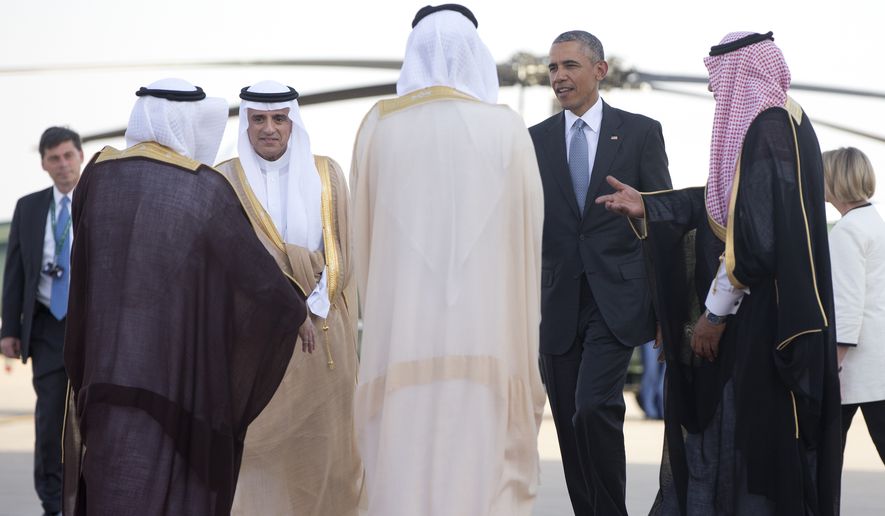ANALYSIS/OPINION
On Sept. 11, 2001, at least 19 men — 15 of them Saudi citizens — boarded several commercial flights and executed the largest terrorist attack ever on U.S. soil. That event set off two major wars in the Middle East, both still ongoing at some level, and it signaled a new age in American foreign policy in which the U.S. is increasingly focused on deterring state sponsors of global Islamic terrorism.
The connection between Saudi financial support for the 9/11 attacks has become clearer as plaintiffs in several federal cases seeking compensation have revealed in discovery documents. It is clear that the attackers had major financial and organizational support for their U.S. operations, support that could not have been possible without Saudi citizens’ ability to conduct themselves and their business on U.S. soil without special scrutiny.
There is also evidence that lower-level officials within Saudi Arabia’s U.S. diplomatic corps, acting on the auspices of the Saudi Ministry of Islamic Affairs, provided “charitable” contributions to individuals who later carried out the attacks.
Whether the Saudi government itself was responsible for the attacks, or whether elements within the Saudi regime were key enablers of the attacks, it makes little difference in practice. It is indisputable that the U.S.-Saudi relationship provided cover for elements within the country to penetrate and attack innocent Americans on U.S. soil.
As President Obama returns from a foreign trip that included Saudi Arabia, U.S.-Saudi relations are at an all-time low. A bipartisan coalition within the U.S. Congress has pressed the government to release documents related to the 9/11 Commission report that have not been publicly shared. It is alleged that some of those documents, in a so-called “28-page report,” detail Saudi Arabia’s awareness, involvement and/or complicity in the attacks.
On Friday, the former chairmen of the commission released a statement saying the 28 pages are merely “comparable to preliminary law enforcement notes” that form leads for investigations but are usually not released to the public. They said those leads and the subsequent investigations uncovered no evidence of direct Saudi government complicity.
Regardless, these documents should be immediately released to the public, and should form part of the basis for a determination of whether the Saudi regime’s U.S. assets can be used to satisfy civil judgments arising out of litigation.
Notably, the Saudi regime itself has pushed for the release of the documents, claiming that its actions with regards to its relationship with the U.S. are beyond reproach and should be open to inspection.
Furthermore, unlike other nations deemed state sponsors of terrorism, such as Cuba and Iran, Saudi Arabia has vigorously defended itself in lawsuits accusing it of terrorism. Their lawyers have consistently argued that it is not in Saudi Arabia’s interests to attack America, citing a decades-long relationship of mutual support. They also note that the Saudi government keeps close to $1 trillion of sovereign wealth in U.S. assets. Why would it want to harm those interests by attacking America?
While plaintiffs in several class-action suits in U.S. federal courts have sought to hold Saudi Arabia financially liable, both U.S. and international law adhere to the concept of “sovereign immunity,” which holds that foreign governments (and their U.S.-held assets) are immune to liability in foreign courts. One of the notable exceptions to this framework holds that it does not apply to countries designated under U.S. law as “state sponsors” of terror. While that does mean Iran or Cuba can be held liable in U.S. courts, Saudi Arabia is not designated as a state sponsor and thus can claim sovereign immunity.
An attempt at piercing the shield of sovereign immunity is making its way through congress. The Justice Against Sponsors of Terrorism Act (JASTA) would also apply retroactively to injuries arising out of the events of Sept. 11, 2001. The bill has gathered widespread bipartisan support, including support from both Democratic presidential candidates, as the notion of collecting damages from Saudi Arabia resonates deeply with the survivors of the terrorist attacks. But the Obama administration has threatened to veto the bill in its current form, arguing it would expose U.S. assets abroad to foreign courts, with wide-ranging and troubling implications.
Saudi Arabia has reportedly indicated to members of the Obama administration that should JASTA become law, it would immediately liquidate and repatriate its U.S. assets — a major break in the U.S.-Saudi alliance. The kingdom says that even if it were ultimately cleared of involvement in the attacks, its assets could be frozen indefinitely by U.S. courts pending the outcomes of the cases, reducing their value and making investment in the U.S. a loser.
While such fire sale conditions could potentially cause global economic turmoil, the U.S. could ultimately withstand such a temporary shock. What isn’t so clear is if Saudi Arabia could withstand U.S. pullback in its military and defense commitments, especially given the recent instability involving ISIS, Iran and the failing regimes in Yemen, Syria and Libya. All of these pose potentially existential threats to the Saudi regime. The time may have come for Saudi Arabia to play ball on our terms.
• Armstrong Williams is a national syndicated columnist and sole owner/manager of Howard Stirk Holdings LLC TV.
• Armstrong Williams can be reached at 125939@example.com.




Please read our comment policy before commenting.